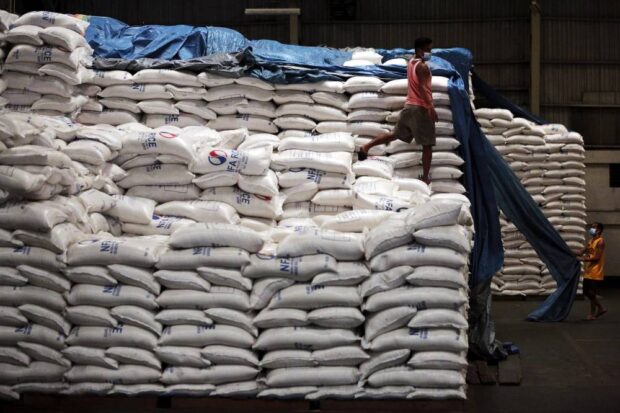
BUFFER STOCK | In this photo taken in November 2020, workers at the National Food Authority warehouse in Quezon City ensure that the government’s rice stocks are properly stored. (File photo by GRIG C. MONTEGRANDE / Philippine Daily Inquirer)
MANILA, Philippines — The Office of the Ombudsman on Monday placed under preventive suspension for six months National Food Authority (NFA) Administrator Roderico Bioco and 138 other officials and employees of the agency amid the ongoing investigation into the alleged anomalous sale of the government’s rice buffer stocks.
Aside from Bioco, the other NFA officials suspended without pay included Assistant Administrator for Operations John Robert Hermano, 12 regional managers, 26 branch managers and 99 warehouse supervisors stationed in Metro Manila; Central Luzon; Calabarzon (Cavite, Laguna, Batangas, Rizal, Quezon); Bicol; Western, Central and Eastern Visayas; Zamboanga Peninsula; Northern Mindanao; Caraga; Soccsksargen (South Cotabato, Cotabato, Sultan Kudarat, Sarangani, and General Santos City); and the Bangsamoro Autonomous Region in Muslim Mindanao.
In its order, the Ombudsman said it found “sufficient grounds” to suspend the NFA officials and employees as “there is strong evidence showing their guilt.”
The charges against them included grave misconduct, gross neglect of duty and conduct prejudicial to the best interest of the service.
READ: NFA head, 138 others suspended over rice buffer stocks sale
It cited a Feb. 12, 2024, letter-complaint to the Office of the President filed by NFA Assistant Administrator for Operations Lemuel Pagayunan, claiming that Bioco and his assistant administrators acted with “manifest partiality, evident bad faith and/or gross inexcusable negligence” when they authorized the sale of allegedly aging stocks of milled rice to select traders at low prices without securing the NFA Council’s approval.
Given the “glaring irregularities” in the disposition of rice, the Ombudsman said the respondents released those stocks and used their official functions by “unilaterally selecting” commercial traders in “utter disregard or violation” of the existing rules.
The complainant was excluded from the suspension order.
Favored traders
In his letter, Pagayunan listed the alleged irregular sale of “treated and fit for consumption” rice stocks made by Bioco to two rice traders — G4 Rice Mill San Miguel Corp. and NBK San Pedro Rice Mill.
Pagayunan claimed that Bioco issued several memorandums allowing the sale of 75,000 bags of “deteriorating or aging” NFA rice totaling P93.75 million to the traders.
He also cited a Nov. 13, 2023, memorandum supposedly issued by Hermano instructing that the stocks be rebagged in containers without the NFA markings before selling them as commercial rice.
Pagayunan alleged that “while the payment for the sale was made directly in the NFA Central Office, no other bidders or buyers were allowed to submit their bid price for the NFA stocks being sold. There is also no showing that the amount paid by G4 and NBK was the best price offered. In short, the buyers were preselected.”
The Department of Agriculture then issued Special Order No. 323 on March 1 forming a fact-finding committee chaired by Bureau of Fisheries and Aquatic Resources Director Demosthenes Escoto “to investigate and determine all the facts and circumstances” of the transactions in question.
Before the suspension, Agriculture Secretary Francisco Tiu Laurel Jr. said in a press briefing on Monday that Bioco had filed a leave of absence “to allow investigators a free hand to undertake the probe, which we expect will go beyond this.”
“We intend to dig deep as far as 2019 at least and welcome those who would come forward to assist us in cleansing the NFA,” he pointed out.
“The preventive suspension will allow the Ombudsman to secure all the documents and other evidence relating, but not limited to, the sale of rice buffer stocks that is greatly disadvantageous to the government,” Tiu Laurel said.
The agriculture chief said he would temporarily head the agency until the NFA Council decides on the leadership vacancy in an emergency meeting on Wednesday.
Senate probe eyed
In the Senate, Sen. Imee Marcos has filed a resolution seeking to investigate the NFA and the controversial sale of rice.
In her proposed Senate Resolution No. 940, Marcos expressed alarm that the NFA has “completely lost its way.”
According to her, the NFA was established to buy palay from local farmers, stabilize rice prices for the Filipino consumer, and ensure a sufficient buffer stock for calamities.
“However, the agency has repeatedly fallen short of its required buffer stock and been unable to cope with higher farm-gate prices of palay, which rose to as high as P27 per kilo last year,” Marcos said.
The government has been resorting to imports to augment the rice supply in the local market in the past several years.
On Monday, President Ferdinand Marcos Jr. told Cambodian Prime Minister Hun Manet during their bilateral meeting that the Philippines was looking at Cambodia as a rice supplier amid the El Niño drought.
The two leaders met on the sidelines of the Association of Southeast Asian Nations-Australia Special Summit in Melbourne that officially starts on Tuesday.
“We really need to look back and engage in terms of trade in agriculture, rice specifically. When I visited you in Cambodia (in November 2022)… we were preparing for this drought. It’s now happening,” Marcos told his Cambodian counterpart, according to the Malacañang Presidential Communications Office.
Marcos told Hun that the Philippines was improving its palay production but “still needs to import to secure its rice inventory and one area to explore and strengthen is to improve its ties with other rice-producing countries like Cambodia.”